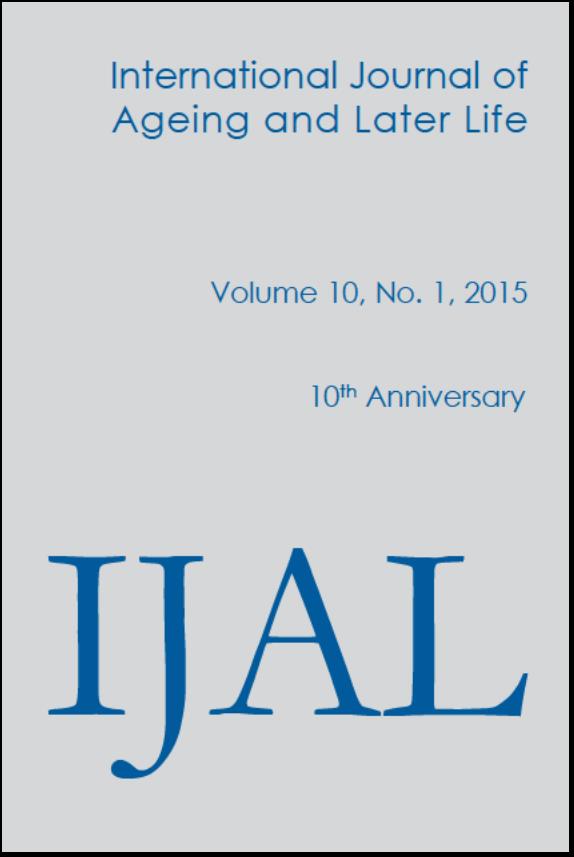Five eye-openers in my life of critical gerontology
Main Article Content
Abstract
This paper is a personal account of five “eye-opening” career experiences in the author’s life that illustrate how biographical events shape opportunities and inspire knowledge- making in critical gerontology. Borrowing from Pierre Bourdieu’s methodological concept of “fieldwork in philosophy,” this account suggests that critical thinking only becomes eaningful in the lived contexts in which it is grounded, negotiated, transformed, and shared. Thus theoretical ideas about ageing, despite their abstract nature, have historical and unpredictable stories of their own that are worthy of a “fieldwork” approach. The paper also emphasises that the “critical” in critical gerontology includes a strong reflexive and self-critical dimension about the subjective conditions of doing gerontological research, especially in the face of gerontology’s claim to be an objective science.
Metrics
Article Details

This work is licensed under a Creative Commons Attribution-NonCommercial 3.0 Unported License.
Since 2020 the International Journal of Ageing and Later Life uses a Creative Commons: Attribution license, which allows users to distribute the work and to reform or build upon it without the author's permission. Full reference to the author must be given.
References
Achenbaum, W. A. (1995). Crossing Frontiers: Gerontology Emerges as a Science. New York: Cambridge University Press. DOI: 10.1017/CBO9780511666803
Achenbaum, W. A. (2013). Robert N. Butler: Visionary of Healthy Aging. New York: Columbia University Press. DOI: 10.7312/columbia/9780231164429.001.0001
Bourdieu, P. (1990). Fieldwork in philosophy (Interview). In In Other Words: Towards a Reflexive Sociology (pp. 3–33). Stanford, CA: Stanford University Press.
Calasanti, T. M. & Slevin, K. F. (2006). Age Matters: Realigning Feminist Thinking. New York: Routledge.
Cohen, L. (1998). No Aging in India. Berkeley, CA: University of California Press.
Cole, T. R., Ray, R. E. & Kastenbaum, R. (2010). Guide to Humanistic Studies in Aging: What Does It Mean to Grow Old? Baltimore, MD: The Johns Hopkins University Press.
De Lauretis, T. (1987). Gramsci notwithstanding, or, the left hand of history. In T. De Lauretis (ed.), Technologies of Gender (pp. 84–94).
Bloomington, IN: Indiana University Press.
Foucault, M. (1997). The masked philosopher. In P. Rabinow (ed.), Michel Foucault: Ethics, Subjectivity and Truth (pp. 321–328). New York: The New Press.
Geertz, C. (1988). Works and Lives: The Anthropologist as Author. Cambridge: Polity Press.
Gilleard, C. & Higgs, P. (2013). Ageing, Corporeality and Embodiment. London: Anthem Press.
Gullette, M. M. (2013). Agewise: Fighting the New Ageism in America. Chicago, IL: University of Chicago Press.
Hendricks, J. (2008). Coming of age. Journal of Aging Studies 22(2): 109–114. DOI: 10.1016/j.jaging.2007.12.015
Katz, S. (1996). Disciplining Old Age: The Formation of Gerontological Knowledge. Charlottesville, VA: University Press of Virginia.
Katz, S. (2000a). Reflections on the gerontological handbook. In T. R. Cole & R. E. Ray (eds.), Handbook of the Humanities and Aging (2nd ed., pp. 405–418). New York: Springer.
Katz, S. (2000b). Busy bodies: Activity, aging, and the management of everyday life. Journal of Aging Studies 14(2): 135–152. DOI: 10.1016/S0890-4065(00)80008-0
Katz, S. (2003). Critical gerontological theory: Intellectual fieldwork and the nomadic life of ideas. In S. Biggs, J. Hendricks & A. Lowenstein (eds.), The Need for Theory: Critical Approaches to Social Gerontology for the 21st Century (pp. 1–31). Amityville, NY: Baywood.
Katz, S. (2005). Cultural Aging: Life Course, Lifestyle and Senior Worlds. Peterborough, Ontario: Broadview Press.
Katz, S. (2006). From chronology to functionality: Critical reflections on the gerontology of the body. In J. Baars, D. Dannefer & C. Phillipson (eds.), Aging,Globalization and Inequality (pp. 123–137).Amityville,NY: Baywood.
Katz, S. (2008). Thinking of age: Personal reflections on critical gerontology. Journal of Aging Studies 22(2): 140–146. DOI: 10.1016/j.jaging.2007.12.012
Katz, S. (2012). Embodied memory: Aging, neuroculture and the genealogy of mind. Occasion: Interdisciplinary Studies in the Humanities 4: 1–11.
Katz, S. (2013). Active and successful aging: Lifestyle as a gerontological idea. Recherches sociologiques et anthropologiques 44(1): 33–49.
Katz, S. (2014). What is age studies? Age, Culture, Humanities: An Interdisciplinary Journal 1(1): 5.
Katz, S. & Marshall, B. L. (2004). Is the ‘functional’ normal? Aging, sexuality and the bio-marking of successful living. History of the Human Sciences 17(1): 53–75. DOI: 10.1177/0952695104043584
Katz, S. & Peters, K. R. (2008). Enhancing the mind? Memory medicine, dementia, and the aging brain. Journal of Aging Studies 22(4): 348–355. DOI: 10.1016/j.jaging.2008.05.007
Katz, S. & Peters, K. R. (eds.) (2015). Special issue: Voices from the field: Expert reflections on Mild Cognitive Impairment. Dementia: The International Journal of Social Research and Practice 14(3): 285–382.
Marshall, B. L. & Katz, S. (2002). Forever functional: Male sexual fitness and the aging body. Body & Society 8(4): 43–70. DOI: 10.1177/1357034X02008004003
Neugarten, B. L. (1988). The aging society and my academic life. In M. W. Riley (ed.), Sociological Lives (pp. 91–106). Newbury Park, CA: Sage.
Scaff, L. (1998). The ‘‘cool objectivity of sociation’’: Max Weber and Marianne Weber in America. History of the Human Sciences 11(2): 61–82. DOI: 10.1177/095269519801100204
Twigg, J. (2000). Bathing: The Body and Community Care. London: Routledge. DOI: 10.4324/9780203190876
Twigg, J.&Martin,W. (eds.) (2015). RoutledgeHandbook ofCulturalGerontology. London: Routledge.





